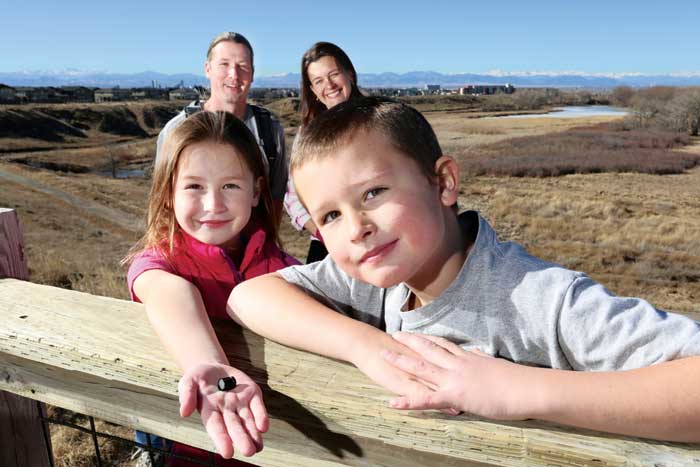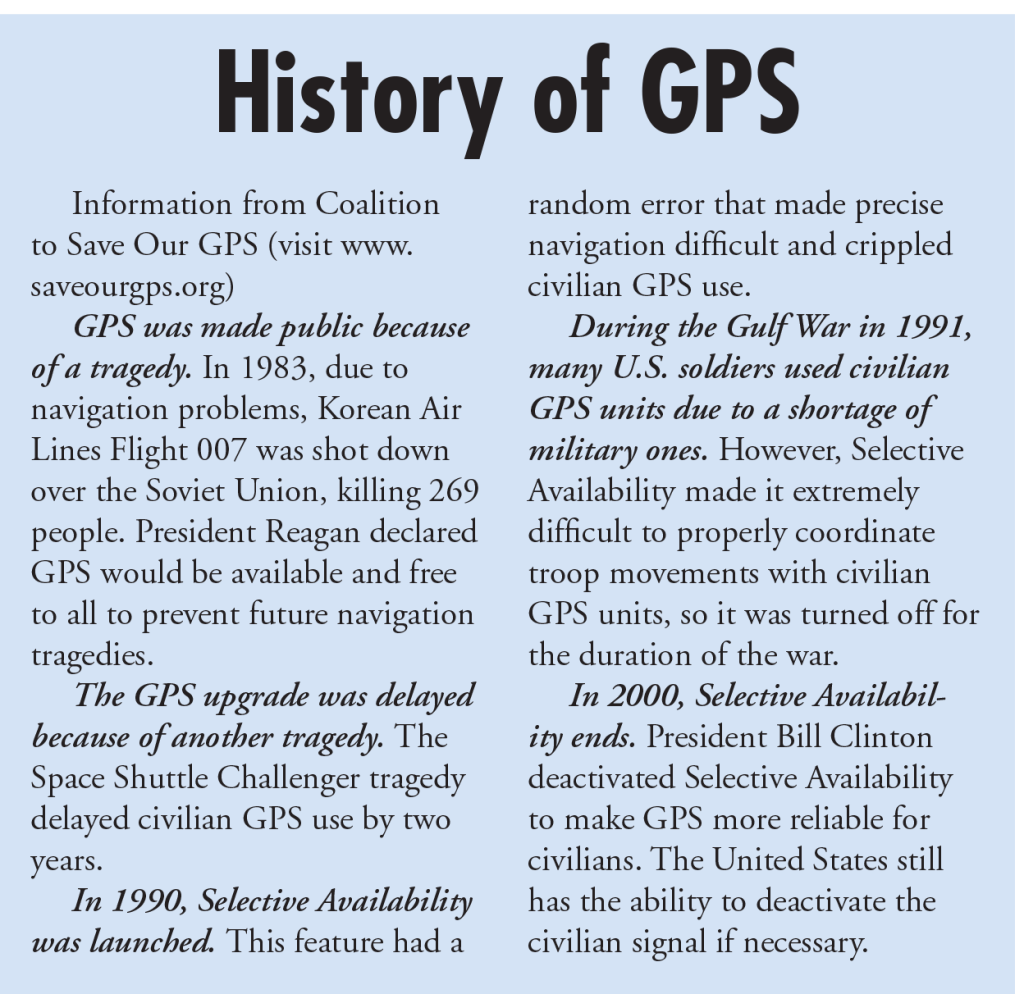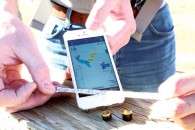
Ben and Kelly Griffith geocache with their two kids Erin, 6, and Steven, 7, at Bluff Lake Nature Center. Erin shows one of the smaller canisters used in the hunt that contains information about Bluff Lake and coordinates to the next cache.
Geocaching, a new high-tech treasure hunting game, is grabbing the attention of people all over the world, and now there are two geocaching hunts at Bluff Lake Nature Center.
Geocaching is an outdoor game using the Global Positioning System (GPS) to find “caches,” or containers that have objects or information, as well as coordinates to the next cache.
Bluff Lake recently set up two geocaching hunts: nine-cache “Welcome to Bluff Lake” and five-cache “Favorite Birding Spots.” Executive Director Jeff Lamontagne says, “It’s a fun, wholesome way to goof off and see different places and things.”
Until 2000, the accuracy of GPS for civilian use had been crippled by “Selective Availability” for national security reasons (refer to sidebar for more information). To make GPS more reliable for civilian devices, President Bill Clinton ended Selective Availability. GPS users were so excited they celebrated by hiding a container and noting the coordinates. Finders used GPS to locate the object, where they took something from the container and left something in return.
Geocaching has grown into a worldwide network with caches hidden everywhere from ice caves in Washington to abandoned ships off the coast of Germany.
Critics say geeks have managed to invent another pointless use of technology, but Lamontagne believes it’s a great way to get outside and learn useful navigational skills.
 The Bluff Lake hunts are easy to moderate, but some caches are very challenging. “It’s a very patient endeavor,” Lamontagne says. Each cache contains information about the nature center and coordinates for the next cache, which can vary in size. Some are the size of a ketchup bottle and others the size of a pinky finger.
The Bluff Lake hunts are easy to moderate, but some caches are very challenging. “It’s a very patient endeavor,” Lamontagne says. Each cache contains information about the nature center and coordinates for the next cache, which can vary in size. Some are the size of a ketchup bottle and others the size of a pinky finger.
The nine-cache hunt takes two to four hours, and the five-cache takes one to two hours. “It seems like it would be easy, but until you’ve done it and you’re in the midst of trees, you don’t realize that there’s so much within 20 or 30 feet,” Lamontagne says.
Stapleton resident and geocaching novice Ben Griffith recently did the “Welcome to Bluff Lake” hunt with nine family members. “It was great. Everybody had fun. We had the grandparents and all of the cousins involved.”
Griffith, the technology paraprofessional at William Roberts, says, “You could say I like technology,” and laughs. He first went geocaching last summer when a friend visited Stapleton and suggested trying it in the neighborhood.
People can join the geocaching world by registering online at www.geocaching.com. Then download the free Geocaching app on a smartphone and search for caches in the area. “You can turn it on wherever you are and find caches nearby,” he says. “There’s a surprising amount in the neighborhood.” He describes it as a sophisticated Easter egg hunt or hide-and-seek game.
Griffith suggests also downloading the $1.99 Motion X GPS app. Unlike the free app, Motion X allows you to plug in coordinates and navigate on your own rather than following arrows to the cache.

Each cache contains a small piece of paper with coordinates to the next cache that participants plug into a smartphone GPS app.
He enjoys geocaching with his 6- and 7-year-olds, whose favorite part is searching under and around objects once they’ve reached the right coordinates. “It’s something to do with the kids when it’s a beautiful day, and you’re tired of going to the parks or doing the usual kind of stuff.”
He and his family plan to return to Bluff Lake soon for the Favorite Birding Spots hunt, which takes players to a cliff bank where birds make their homes and a tree with woodpecker holes.
For more information, contact Jeff Lamontagne at jlamontagne@blufflake.org or 720.708.4174 or visit www.blufflake.org/wordpress/programs/geocaching-hunts.



0 Comments